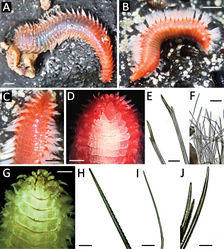Eurythoe laevisetis
| Notice: | This page is derived from the original publication listed below, whose author(s) should always be credited. Further contributors may edit and improve the content of this page and, consequently, need to be credited as well (see page history). Any assessment of factual correctness requires a careful review of the original article as well as of subsequent contributions.
If you are uncertain whether your planned contribution is correct or not, we suggest that you use the associated discussion page instead of editing the page directly. This page should be cited as follows (rationale):
Citation formats to copy and paste
BibTeX: @article{Arias2013ZooKeys337, RIS/ Endnote: TY - JOUR Wikipedia/ Citizendium: <ref name="Arias2013ZooKeys337">{{Citation See also the citation download page at the journal. |
Genus: Eurythoe
Name
Eurythoe laevisetis Fauvel, 1914 – Wikispecies link – Pensoft Profile
- Eurythoe laevisetis Fauvel, 1914: 116, pl VIII fig. 28-30, 33-37. Type locality: São Tomé Island, Gulf of Guinea.
Material examined
Eurythoe cf. complanata: Gozo Harbour (Malta), 35°50'N, 14°35'E (Mar. 2011): BOS-Amp3 (2 specimens), BOS-Amp4 (9 specimens).
Eurythoe complanata: Isabel II Island (Chafarinas Islands, Spain), 35°11'N, 2°26'W (Sep. 1992): MNCN 16.01/3340 (1 specimen); (Jul. 1993) MNCN 16.01/33394 (1 specimen).
Diagnosis and description
Body depressed elongated, rectangular in cross section. Specimens from Malta ranged in length from 14 to 52 mm with a mean of 39 mm (N=11, SD=12.09). Live specimens have a uniform orange-pinkish colour (Fig. 2A–C), on which the gills and a bright red caruncle stand out, and white chaeta fascicles forming two longitudinal bands along the body (Fig. 2A, B). Prostomium rounded with 2 pairs of inconspicuous eyes arranged in a square and three antennae, two lateral ones in an anterior position and one slightly behind the others. The anterior end has a bilobed prebuccal lobe where are inserted a pair of cirriform palps (Fig. 2D). The caruncle is elongated and extends until the third chaetiger (Fig. 2C, D). Each segment is provided with a pair of arborescent gills that are present from the second chaetiger to the posterior region (Fig. 2C, D). Biramous parapodia with digitiform dorsal and ventral cirri, similar in size. Notochaetae of two types: very fine with a small spur that continues in a capillary-like thorn; and thicker with a marked spur (spurred capillary notochaeta) (Fig. 2F). The neurochaetae are spur-type and thick, slightly denticulate on juveniles (Fig. 2E).
Remarks
Several Maltese specimens present evidence of regeneration of the anterior and posterior end. All preserved specimens have whitish colour and lack the characteristic harpoon notochaetae. The two pairs of eyes are extremely inconspicuous, the anteriormost being similar in size to the posterior one. Specimens from Malta and Chafarinas Islands were morphologically identical to the Atlantic Eurythoe laevisetis from the Canary Islands and Cape Verde and Eurythoe laevisetis from São Tomé Island.
Taxon Treatment
- Arias, A; Barroso, R; Anadón, N; Paiva, P; 2013: On the occurrence of the fireworm Eurythoe complanata complex (Annelida, Amphinomidae) in the Mediterranean Sea with an updated revision of the alien Mediterranean amphinomids ZooKeys, 337: 19-33. doi
Images
|
